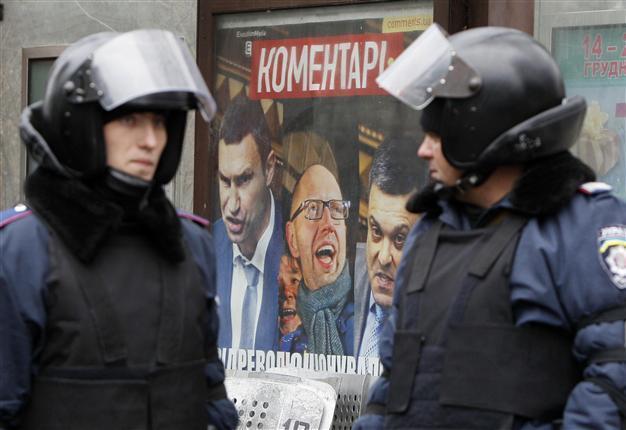Ukraine leader seeks cash from Putin amid protests
KIEV - Agence France-Presse

Interior Ministry personnel stand guard near an advertisement of a local periodical showing opposition leaders (from R to L) Oleh Tyahnybok, Arseny Yatsenyuk and Vitaly Klitschko in Kiev, December 17, 2013. REUTERS photo
Ukraine's embattled President Viktor Yanukovych leaves behind furious anti-government rallies on Tuesday to negotiate a multi-billion lifeline with Russia's Vladimir Putin that protesters fear will ruin their EU integration dreams.The ex-Soviet nation of 46 million has been at the heart of a furious diplomatic tug of war since Yanukovych's shock decision last month to ditch a landmark EU partnership agreement and seek closer ties with its traditional master Russia.
Tuesday's high-stakes meeting at the Kremlin comes two days after frustrated EU officials suspended months of negotiations they had hoped would pull Ukraine out of Russia's orbit for the first time.
Diplomats in Brussels cited Yanukovych's continued courtship of Russia for their decision and demanded a firmer commitment to EU standards on political freedoms and economic reforms.
"Ministers confirmed again today the European Union's readiness to sign the (agreement) as soon as Ukraine is ready and the relevant conditions are met," EU foreign policy chief Catherine Ashton said on Monday after a ministerial meeting in Brussels.
"We believe that the agreement provides the best way to address Ukraine's short-term economic challenges," Ashton said.
But Yanukovych will instead be hoping to win an urgently needed cash advance from Russia -- estimated by local media at anywhere between $5 and $12 billion (3.6 and 8.7 billion euros) -- that his critics view as Putin's reward for Kiev's U-turn on the EU pact.
"A Russian loan can help Yanukovych keep power," said Ukrainian political analyst Volodymyr Fesenko.
"And the Kremlin is ready to help him because this meets Putin's strategic interests," the analyst said.
Yanukovych's reversal sparked the largest anti-government rallies since the 2004 pro-democracy Orange Revolution that first nudged Ukraine on a westward path.
It has also exposed the deeply embedded cultural fault lines that run between the nationalist and Ukrainian-speaking west of the country and the more Russified east aligned with Moscow.
The Ukrainian government has organised counter-rallies by bussing thousands of people into Kiev from eastern regions where Yanukovych enjoys broader support.
Yet those demonstrations have been dwarfed by the pro-EU protest -- a permanent camp that features rock concerts and gathers hundreds of thousands on the same central square that was at the heart of the 2004 revolt.
The latest mass rally attracted nearly 300,000 people to central Kiev on Sunday and the opposition plans to hold another monster rally on Independence Square on Tuesday evening aimed at putting still more pressure on Yanukovych during his Kremlin talks.
Events in recent days suggest Yanukovych is scrambling for a way out of the deepest political crisis of his nearly four-year rule.
He held an inconclusive meeting with three top protest leaders on Friday and followed that up by sacking senior officials whom he held responsible for a violent crackdown on protesters at the end of last month.
His own ruling Regions Party on Monday also encouraged Yanukovych to conduct a major government overhaul that could possibly take some steam out of the protest movement.
But the Ukrainian leader has firmly rejected the opposition's main demand that Prime Minister Mykola Azarov resign immediately and fresh presidential and parliamentary polls be held.
Yanukovych hopes to sign a series of deals with Putin that besides the loan include an agreement for cheaper Russian natural gas shipments that could provide some relief to Ukraine's wobbly economy.
But demonstrators fear that Yanukovych will in fact be putting Ukraine on a path toward future membership in a Russian-led Customs Union that Putin hopes to build into a rival to the 28-nation EU bloc.
The Ukrainian government flatly denies that a Customs Union deal will be signed on Tuesday. But this has failed to allay the protest movement's worst fears.
Nationalist opposition leader Oleg Tyagnybok said his Svoboda (Freedom) party had learned that Putin planned to reward Yanukovych for delaying the EU deal's signature with a $5.0-billion (3.6-billion euro) loan.
He said Russia would also lower the gas price it charges the Ukrainian state energy company to $200-$300 per thousand cubic metres from the more than $400 that it pays now.
"That is the baggage Yanukovych is taking with him to Moscow," Tyagnibok told reporters.
Kremlin adviser Andrei Belousov confirmed that Russia may give Ukraine a much-needed loan but provided no other details.
















